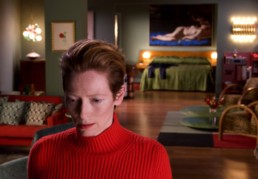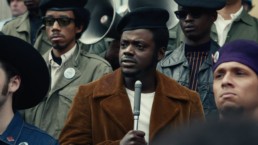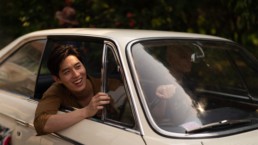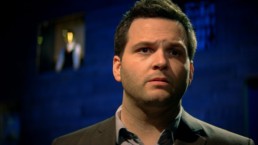'Shiva Baby' Review: Fans of 'Fleabag,' This Film's For You
In Judaism, "sitting shiva" is the week-long mourning period that is observed following the passing of a first-degree relative. In Shiva Baby, a millennial undergrad feels the same sort of deep mourning, albeit over the current state of her young life. When Danielle (Rachel Sennott) returns home from NYU to attend a funeral, she knows that she's also entering the lion's den of an overbearing family. The equal parts eager and concerned "How are you?" triggers her anxieties of her uncertain future.
Danielle easily soothes family members expectations with talks of post-grad ambitions (either business or law school). In reality, she's concealing the fact that she's academically middling and currently involved with a sugar daddy in the big city. It's not until the arrival of an unexpected guest that Danielle's shakily constructed life starts to crack. It all sets the stage for an event where everything is set to come out.
Personal Expression
Shiva Baby is such a refreshing and enjoyable new comedy due to how totally authentic the characters and situations all feel. It's not altogether surprising, given that the film is based on the experiences and observations from writer and director Emma Seligman's own life, here making her directorial debut. Seligman's shrewd observations of the Jewish culture along with a new millennial identity make for a wonderfully cringe-worthy but very real culture clash. From the specificity of detail in the shiva setting and the hilarious characters who attend it, down to its stark portrayal of young people owning their newfound sexualities, Shiva Baby is the type of equal-parts defiant and personal filmmaking that make for the best kind of directorial debuts.
Daring
While set to a fairly conventional narrative structure (that of a person returning to the home they once left and by doing so, are forced to confront their true selves), Shiva Baby merely uses this foundation to then make daring leaps from. Danielle (played note-perfect by newcomer Rachel Sennott) brings a new young woman character (made popular by Lena Dunham's Girls and Phoebe Waller-Bridges' Fleabag) to the big screen, who, for all of her flaws and poor decision-making, remains unapologetically herself. By her casually decided choices of engaging with a sugar daddy as well as exploration of bi-sexual attractions, Danielle subverts every expectation that both her age and gender are typically met with. In doing so, Shiva Baby shows a very real and untraditional character of female empowerment.
Craft
Shiva Baby smartly uses its single setting location to bring many elements of filmmaking together to control its tone–that being a cringe-worthy one every truth that Danielle skirts only raise the stakes to becoming a pressure cooker of discomfort (halfway through the film when she bursts out of the house to get air, we are desperately grateful for it as well).
This hilarious suffocating experience n is controlled by the entire filmmaking team: Hanna A. Park's measured and then energetic editing controls each new wave of discomfort wonderfully. Maria Rusche's cinematography captures the jam-packed nature of this house (building to a near-hallucinatory climax that reminded me of Rosemary's Baby). And of singular note, composer Ariel Marx's score is quite actually the thing that stands out that gives Shiva Baby its anxiety-inducing identity, an off-beat tension that reminded me of Jonny Greenwood's score for Punch Drunk Love. All elements swirl to make for a cringe-worthy setting, which is pretty rad to see this all-female unit.
For our exclusive interview with Ariel Marx, click here.
Impact
Shiva Baby is sure to stay on your mind long after watching it (as it has for me). Seligman's self-assured vision, in which all of the elements of stress and tension had me on the edge of my seat wondering how Danielle would escape the next lie, are hilariously constructed. I really can't remember the last adult comedy that felt so edgy, raunchy, risky, yet smart. Along with the fact that this type of character, unsure how to move forward at this point in their life) is typically now only seen in TV (Fleabag, Girls), it's refreshing to find it in a film (I hate to break it to you Judd Apatow, but The King of Staten Island didn't feel anywhere near as enjoyable as Shiva Baby).
Conclusion
I absolutely love recommending a film like Shiva Baby, a directorial debut that is both successful in its own right and makes me look forward to what lies next for the whole filmmaking team. Especially as theaters slowly re-open and new releases continue to struggle to find mass distribution, it's such a gift to get the chance to be able to see a new film like this one that also happens to be one of the funnier adult comedies to come out in recent times. Get behind this one, baby.
77 minutes. 'Shiva Baby' is not rated. Available to rent on Apple TV+ and Amazon.
https://www.youtube.com/watch?v=8uT1M9WfqYA&ab_channel=Utopia
'The Human Voice' Review: Tilda Swinton Captivates in Almodóvar’s Latest
At just thirty minutes long (the length of a TV episode), Tilda Swinton commands every second of the small screen in Pedro Almodóvar's beautifully staged and winkingly meta new short film, The Human Voice.
With Tilda Swinton as the film's singular character, The Human Voice (which was also selected to play at last year's Venice Film Festival) is a devilishly playful bit of pop-art filmmaking that sees the director combine his source material’s wonderfully satiric silliness and makes it a meta viewing experience that comments on both film production and how we communicate as humans.
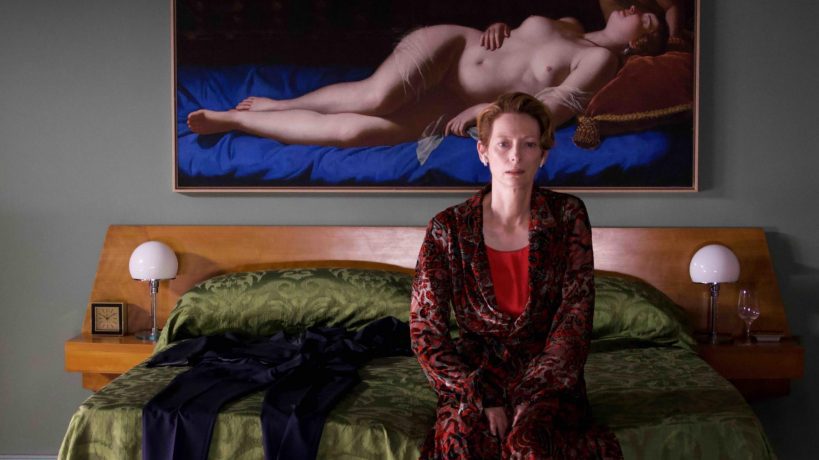
In The Human Voice, Swinton plays an actress unhinged, at first silent and vacant as she sulks about her decadent and deadening modern apartment, but then firey and alive at the sound of her iPhone ringing, her lover on the other end of the line.
Over the course of their on-off conversation (of which we only hear Swinton's side of throughout the entirety of the film) she switches from depressed and pilling boozer, to desperately needy partner, to rage-filled and scorned woman of the world all in a moment’s time.
It's a high task to have to create the entirety of a world when you’re acting alone, but if there’s anyone in Hollywood who can do the job, it’s Ms. Swinton, whose talents and stamina make the film captivating. What she does so effortlessly–communicating an entire story and relationship of a fictionalized, passionately troubled couple–is accomplished all by way of using a singular element: her voice.

And she does this with gymnastic range, pitching up her voice to harken back to old Hollywood romantic starlets, and then down-shifting gears into a lower register to convey darker colors. Her voice work on display here is as vital and deadly as any of Almodóvar's beautifully composed hardware and tools that are so artfully composed within the background.
The Human Voice does communicate a narrative story (kind of), but just as Almodóvar makes a point of regularly reminding us that the apartment is in fact a set within a soundstage, and the actor alone within it all, the film should really be watched and appreciated for what it is: an exercise in filmmaking where the audience gets the rare chance to deconstruct, study, and understand all the parts that go into the art of filmmaking, which feels so special to get during a crossroads in film production when everything was flipped on its head. Personally, I think it’s something worth shouting for.
30 minutes. ‘The Human Voice’ is now playing in Los Angeles at the Vineland Drive-In Theater.
https://www.youtube.com/watch?v=G3lGM39dKuY&ab_channel=SonyPicturesClassics
Gavin Brivik Interview: 'Wild Indian' Composer On Film Scoring
Premiering at this year's (virtually held) Sundance Film Festival, Wild Indian is a tension-filled drama that explores the aftermath of an act of violence, and the lives that are altered and emotions that are repressed following it. After seeing the film and feeling moved, I felt that I had to talk to the film's composer, Gavin Brivik, to learn more about his creative process.
Read our review of 'Wild Indian' here.
In terms of tone, it's a huge departure from a film like the 2018 cult-hit Cam, which is the film that composer Gavin is perhaps most widely known for scoring.
A Kansas City native, Gavin Brivik is an exciting young musician and film composer whose work in music scoring is already ambitious, experimental, and fearless.
I had the pleasure of meeting and chatting with Gavin on the heels of Wild Indian's release (the film is currently seeking distribution), and during our interview and Zoom call, we talked about everything from inspirations (Oneohtrix Point Never and Johnny Greenwood), his creative process (the creative opportunity of scoring to "themes" over picture), and the exclusive news announcing a vinyl release of the Cam score and soundtrack.
Check out the conversation with Gavin, and keep your eyes peeled for where this young talent will appear next.
https://youtu.be/EQdo6iL3asI
'Judas and the Black Messiah' Review: Daniel Kaluuya Electrifies
If you, like me, were previously unaware of activist Fred Hampton's story, writer and director Shaka King looks to educate audiences with his biopic Judas and the Black Messiah (now streaming on HBO Max). King brings Hampton's story to the big screen by telling the real-life events of how an FBI informant infiltrated Hampton's Black Panther Party, became the chairman's confidante, and ultimately aided in his politically-motivated death.
To tell this story, Judas and the Black Messiah needs to start by telling the story of Bill O'Neal (LaKeith Stanfield), a young troublemaker who, after a run-in with the law, is hired by an FBI officer (Jesse Plemons) to infiltrate Fred Hampton's (Daniel Kaluuya) inner circle within the Black Panther Party for the government's tracking. Taken in by the promise of expunging his record (and eyeing the opportunity to attain a lavish lifestyle), Bill starts attending meetings in which Hampton–or "Chairman," as his followers reverentially call him–inspired the masses through urgent, commanding visions and plans of growing Black Power messages in a post-MLK and Malcolm X world.
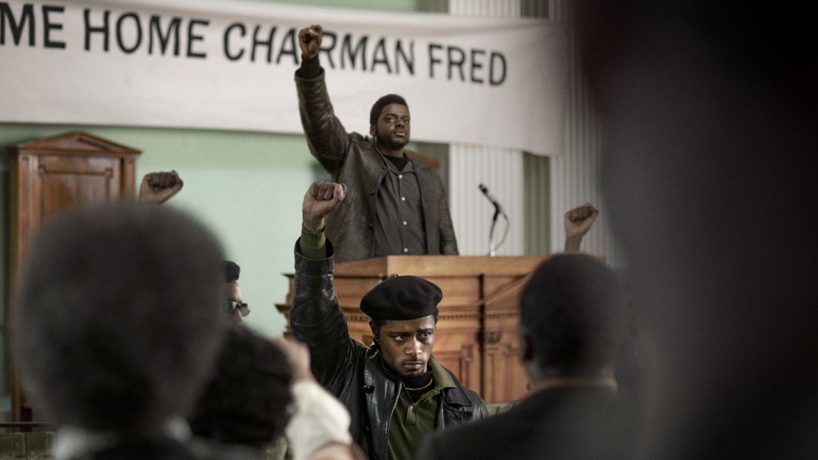
Daniel Kaluuya gives so much to embody the Chairman, bringing primal urgency in his wall-shaking speeches as well as quiet reflection in more intimate moments. It's clear that while Judas and the Black Messiah is driven by the central story of a rat in the henhouse, Shaka King naturally veers from this plot to show even more of Chairman's life, which includes a beautifully blossoming relationship with Deborah Johnson (Dominique Fishback). Their shared scenes, in which the two exchange ideas of inspired poetry and favorite speeches, are pure cinema magic (and Fishback is a revelation in the film). While Lakeith Stanfield does an admirable job of bringing the ethically-compromised Bill O'Neal to the big screen, the more the film goes on (with scenes that feel impactful, but standalone), the more it feels like his story of snitching feels less like the central reason we should be watching.
Sean Bobbitt's (Widows) cinematography captures this 60s era period with a distinct and beautifully cinematic vision. Jesse Plemons' presence adds further weight to the film, and Martin Sheen also appears (with noticeable makeup) as the power-hungry J. Edgar Hoover. And on a poignant final note, the film is framed by an interview with the real Bill O'Neal right before the credits roll.
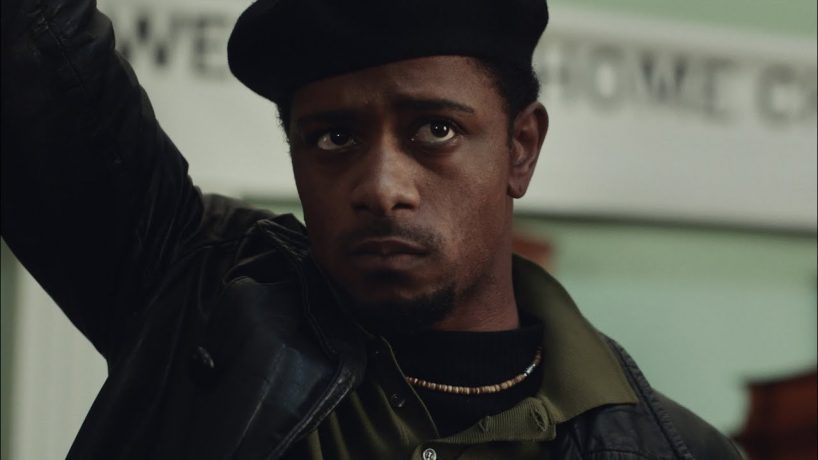
The overall impact of Judas and the Black Messiah–which ends in a painfully powerful spree of gunshots–is overwhelming and deep, as I still think about the film regularly even after seeing it premiere at this year's Sundance Film Festival weeks ago. Through telling Fred Hampton's story, Shaka King channels the entire spectrum of the Black experience–from the beautiful poetry and unshakeable perseverance through the sadness and rage that protesting and oppression bring, which is very much felt in today's America. Through Kaluuya's bellowing speeches and Shaka King's direction, Judas and the Black Messiah will echo for a long time to come.
126 min. ’Judas and the Black Messiah' is rated R for violence and pervasive language. Now playing on HBO Max.
https://www.youtube.com/watch?v=sSjtGqRXQ9Y&ab_channel=WarnerBros.Pictures
'Jockey' Sundance Review: A Look at the Last Leg of One's Life
In Jockey, riding a horse is where you're the freest. It's when you're off of the horse where the real struggles come, where you must confront the larger issues in life, such as the decline of your physical health and perhaps even the shortcomings of your own life.
These are the realities that the film's writer/director, Clint Bentley, knows well, having grown up in the world of horse racing, as a young boy, watching his father live as a jockey. It's with this reverential love and respect for his late father's life–a hard one–that makes his feature film debut, Jockey, such a deeply personal accomplishment.
Rather than center the film around the adrenaline-pumping moments in the saddle, Bentley focuses his directorial debut around the life of a jockey lived outside of racing–a tough one lived on the backside of the race-grounds which the career demands (think The Wrestler here). This is the life that Jackson (Clifton Collins Jr.) leads, a once-winning jockey whose prime is now behind him, who now struggles to keep up with the pack as he enters the twilight of his career. It's when Jackson attempts to get in shape for one last championship run that he is met with new debilitations, forcing him to recognize that the demands of the job may outpace what he's able to give.
Reflecting on one's physical limitations is also a ripe time to come to terms one's personal life, which is what Jockey does, and where it feels like it becomes a second film–that of a father/son movie. When rookie Gabriel (Moises Arias) arrives and approaches Jackson–bearing a striking physical resemblance to him–the two begin to foster a bond, in which Jackson begins mentoring him while he attempts to make his own final training run.
The connection created by Clifton Collins Jr. and Moises Arias here is sincere, and Clint Bentley captures it with tenderness. Family is a central theme to Jockey, that of the one we are given and the one that we make. In another noteworthy recognition to the film, Molly Parker also joins the story as Ruth, Jackson's horse trainer, providing another layer of makeshift family dynamic.
A decision that Clint Bentley makes that gives Jockey its heartfelt effect is by blending the actors into a very raw environment in which they act opposite non-actors–real jockeys who share their life's stories, adding incredbile realism to this world (Chloé Zhao's The Rider comes to mind here). Scenes of debilitated jockeys sharing their stories in support group settings offer a continuous discovery, more than a pre-written script could. And moments like these–which Jockey has throughout–allows you to buy into this world so totally and completely.
Of final note here, is that the overall beauty that Clint Bentley captures gives the film the cinematic touch that it needs to transcend. While the life of a jockey, lived in a trailer is totally unglamorous, stunning camerawork by Adolpho Veloso captures beautiful moments of early sunrises and dusk sunsets in brilliant pink and blue golden hour hues. And when the film does see its jockeys racing, the ethereal music composed by The National's Dessner Brothers takes on a heavenly, spiritual nirvana–a moment when everything else falls away.
If you're looking for a meditative film about mortality and entering the twilight of one's life, as well as if you want to see a more intimate look at the world of horse racing, then Jockey is for you. The film makes one of its deepest statements when Ruth offers Jackson the sage advice that "You have to tell a horse when it's time to quit." And although that day in which we'll inevitably have to quit comes for all of us, Jockey shows that an indomitable spirit never will.
'One For The Road' Sundance Review: A Gorgeously Travelled Journey
One For The Road begins with a familiar setup: two friends embark on a road trip so that one, cancer-stricken, can make amends with people from his past. Director Baz Poonpiriya takes this starting point and breathes dazzling cinematic life into it, making One For The Road so much more than just a buddy road film but rather a joyful, sorrowful, romantic, and nostalgic meditation on life, love, and loss.
When NYC bartender and ladies man Boss (Tor Thanapob) receives a call from old friend Aood (Ice Natara) with news that he is dying, Boss agrees to meet him in their Thailand hometown so that he can join Aood as he visits ex-girlfriends to make amends for past behavior. This road trip, in which Aood pops cassettes into the car with exes' names on them while deleting their contacts from his phone after each visit, spans One For The Road's first act. As the pair continue on their chaptered present-day visits, the film intercuts with flashbacks of their previous New York City friendship–which includes Boss' former love Prim (Violette Wautier). This all builds to the reveal that Aood has one last secret he intends to disclose to Boss, which threatens to destroy their friendship as his life nears its end.
One For The Road is an incredibly wide-ranging and liberated film, in both emotional range and narrative. Poonpiriya is such a confident and expressive filmmaker; when the film is joyful and going for a joke, it's completely silly and when it's sad, it down-shifts into a somber, melancholic manner. And while these shifts in emotional exploration do feel discohesive, the leaps in the film's narrative exploration keep it from being a flat-out flawless film. But there's so much richness and abundance and ideas Poonpiriya is expressing–which are also so well-executed–that we get swept up in it regardless.
The most obvious wow-factor is the mesmerizing cinematography (which, is probably to be expected for a film produced by the legendary cinematic master Wong Kar-wai). Poonpiriya's vision is exacted by cinematographer Phaklao Jiraungkoonkun. The film dazzles with vibrant colors, gorgeous widescreen compositions, and fluid movements that capture sequences of lusciously made cocktails and stunning locations, including the coast of Thailand and New York City.
One For The Road should be celebrated for its beautiful vision, as it's one of the most gorgeous films I've seen in some time. While the film would arguably be better if it were more focused on a single identity, the fact that Poonpiriya so easily and confidently shifts genre and moods to fit the nature of the moment was a move that I find I enjoy. There's so much cinematic richness here that I found myself won over, especially in the film's final act, which is the most emotionally resonant and affecting.
This is a gorgeous memory film that captures life events so naturally and beautifully. It's a meditative look at our mortality and saying goodbye to the ones we love. Let yourself be swept up in this film, where intricately crafted cocktails, beautifully harmonious colors, and incredible camerawork will leave you drunk in love.
'Derek DelGaudio's In & Of Itself' Review: Understanding Our Illusions
What better way to convey that the beliefs we hold around the perceptions that we construct–whether of the outside world or our very identities–are nothing more than illusions, than by combining emotional storytelling with sleight of hand trickery? That's the winning combination that makes up the equal parts inventive and compelling new film from Derek DelGaudio, in Derek DelGaudio's In & Of Itself, an enlightening existential experience that uses showmanship to sell self-help. It's an experience that I will remember today, tomorrow, and likely for the rest of my life.
Performed over 552 times in a small NYC black box theater, the film (now available to watch on Hulu) is an assembly of multiple shows in which Derek DelGaudio dazzles audiences in broad and intimate fashion through mythology, personal storytelling, and sleight of hand.
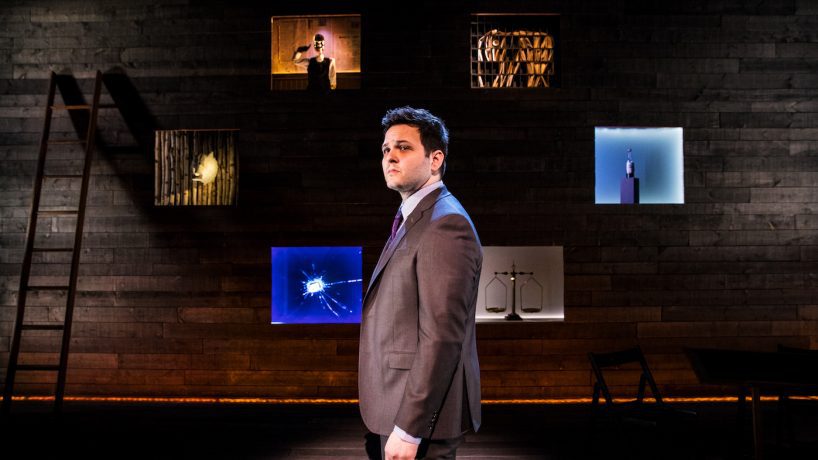
By interspersing magic through parables and personal stories, it's kind of like if your therapist were to quite literally pull a rabbit out of their hat to show you that what you think you know, you really don't.
The main idea that Derek DelGaudio brings forth is that our identities, and the roles we play in life, are constructions often limiting to who we really are. He presents chaptered mythological stories – that of "The Rulatista" entering into Russian roulette, the story of the dog and the wolf, and the elephant that we never perceive in whole, but only in its parts – that add a sense of timeless lore and weight to the event.
But he also gets deeper, talking about the personal stories that made him the way he was – a tough upbringing as a single child with a single parent.
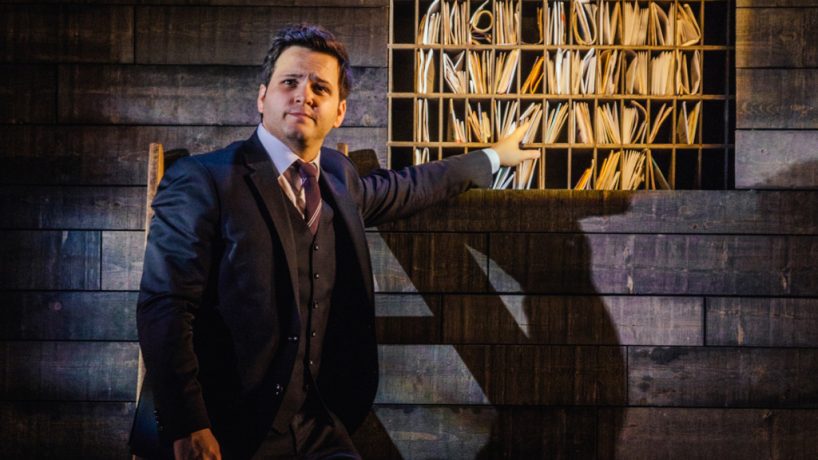
DelGaudio the performer plays his emotions and scripting close to his three-piece suit's vest, limiting his emotional range to carefully constructed in which he retains full control. He is an unassuming performer, which he uses to be more "human" than "showman".
Executive produced by Stephen Colbert and directed by Frank Oz (Yoda!), In & Of Itself is carefully balanced between a one-man show that ebbs and flows with measured laughs, solemn listening, and then bursts of amazement which makes for an intimate experience.
As someone with an interest in theater, self-help, and magic, I unapologetically loved Derek DelGaudio's In & Of Itself and would recommend this to anyone I know. Once we better understand illusions, who knows what the future has in store for whoever we choose to become.
'Derek DelGaudio's In & Of Itself' is now available to watch on Hulu.
https://www.youtube.com/watch?v=_62BeXxd_jo&ab_channel=Hulu
'Some Kind of Heaven' Review: Fantasy in a Retirement Community
Fulfillment, satisfaction, completion, contentment, peace. It's what we're all striving to achieve in our lives. Yet life is hard, and we don't always stay on this track. Our flaws and insecurities, measured against our boundless imaginations, can make for a hard reality to adjust to if we're not content with where we're at in life. Especially living in present-day America, where reality has been proven to be whatever personal construction we make it to be, as Some Kind of Heaven shows.
And as we make it into the twilight of our lives, our shortcomings become even more magnified. So, wouldn't a place that offered aging seniors the opportunities to pursue those fantasies be a good thing?
A new documentary, directed by Lance Oppenheim and executive produced by Darren Aronofsky and The New York Times, shows retired living at The Villages, America's largest retirement community. This magical oasis offers its local community an unlimited number of recreational activities to do and, with that, an infinite amount of people you can be.
Home to 130,000 residents, the Florida-set retirement community is shown as a place where the aged have escaped to live out their final years, experiencing the fountain of youth (which is what The Villages founder Harold S. Schwartz advertised to baby boomers).
Oppenheim crafts Some Kind of Heaven into a wonderfully off-kilter experience, in which the dreamy surrealism of The Villages is seen as being in a magical trance.
Some of the gray-haired are clearly okay with having a good time, living out their hedonistic pleasures of "nightclubbing" and meeting new singles. But others, who Oppenheim centers the film around, see the falsehood in the proscenium and grapple with the darkness that lingers at bay.
The characters who Oppenheim follows are strong and distinct: there's married couple Reggi & Ann, who are trying to maintain a marriage under Reggi's cratering mental state (tai chi and drugs assisting). There's Dennis Dean, a van-living man seeking to get close enough into The Villages to find stability (and a sugar mama); and Barbara Lochiatto, a widowed woman looking to step back into romantic life.
Oppenheim crafts Some Kind of Heaven into a wonderfully off-kilter experience, in which the dreamy surrealism of The Villages is seen as being in a magical trance. Captured in 4:3 aspect ratio, the cinematography by David Bloen captures the oddity in the manufactured synchronicity. And it very much captures the illusion of fantasy making our darkness.
Some Kind of Heaven is a must-watch. Its sharp observations make for a documentary that plays like a comedy and a dark drama. And underneath it all is a film about identity.
I'm reminded by a quote from Shantideva: "All the suffering there is in this world arises from wishing our self to be happy." There may be something to that, here. But if all that's too much for you, I know a place where you can go to make all your life's troubles disappear.
Distributed by Magnolia Pictures, available on-demand this Friday, January 15, 2021.
https://www.youtube.com/watch?v=gmRnGHrjl1w&ab_channel=MagnoliaPictures%26MagnetReleasing


